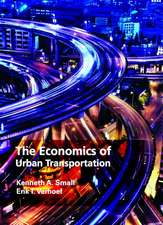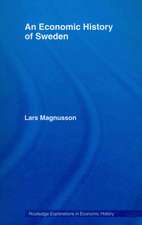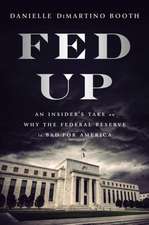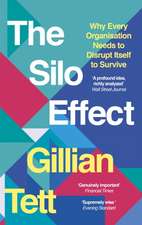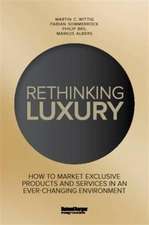Climate Economics: The State of the Art: Routledge Studies in Ecological Economics
Autor Frank Ackerman, Elizabeth Stantonen Limba Engleză Paperback – 4 mar 2015
Climate economics is the bridge between science and policy, translating scientific predictions about physical systems into projections about economic growth and human welfare that decision makers can most readily use but it has too often consisted of an overly technical, academic approach to the problem.
Getting climate economics right is not about publishing the cleverest article of the year but rather about helping solve the dilemma of the century. The tasks ahead are daunting, and failure, unfortunately, is quite possible. Better approaches to climate economics will allow economists to be part of the solution rather than part of the problem. This book analyzes potential paths for improvement.
| Toate formatele și edițiile | Preț | Express |
|---|---|---|
| Paperback (1) | 482.53 lei 43-57 zile | |
| Taylor & Francis – 4 mar 2015 | 482.53 lei 43-57 zile | |
| Hardback (1) | 1166.32 lei 43-57 zile | |
| Taylor & Francis – 24 ian 2013 | 1166.32 lei 43-57 zile |
Din seria Routledge Studies in Ecological Economics
-
 Preț: 311.41 lei
Preț: 311.41 lei -
 Preț: 151.85 lei
Preț: 151.85 lei -
 Preț: 310.31 lei
Preț: 310.31 lei - 26%
 Preț: 819.09 lei
Preț: 819.09 lei - 25%
 Preț: 851.99 lei
Preț: 851.99 lei -
 Preț: 412.70 lei
Preț: 412.70 lei -
 Preț: 487.75 lei
Preț: 487.75 lei - 18%
 Preț: 1167.58 lei
Preț: 1167.58 lei -
 Preț: 397.54 lei
Preț: 397.54 lei -
 Preț: 483.55 lei
Preț: 483.55 lei - 26%
 Preț: 987.21 lei
Preț: 987.21 lei -
 Preț: 411.42 lei
Preț: 411.42 lei -
 Preț: 418.35 lei
Preț: 418.35 lei - 14%
 Preț: 341.66 lei
Preț: 341.66 lei - 11%
 Preț: 336.99 lei
Preț: 336.99 lei - 15%
 Preț: 423.09 lei
Preț: 423.09 lei - 18%
 Preț: 1167.36 lei
Preț: 1167.36 lei -
 Preț: 485.75 lei
Preț: 485.75 lei - 13%
 Preț: 295.07 lei
Preț: 295.07 lei -
 Preț: 480.62 lei
Preț: 480.62 lei -
 Preț: 421.66 lei
Preț: 421.66 lei - 13%
 Preț: 296.68 lei
Preț: 296.68 lei - 18%
 Preț: 1171.54 lei
Preț: 1171.54 lei - 16%
 Preț: 248.15 lei
Preț: 248.15 lei - 18%
 Preț: 1057.75 lei
Preț: 1057.75 lei - 25%
 Preț: 823.44 lei
Preț: 823.44 lei -
 Preț: 492.16 lei
Preț: 492.16 lei - 18%
 Preț: 1064.19 lei
Preț: 1064.19 lei -
 Preț: 413.13 lei
Preț: 413.13 lei - 18%
 Preț: 1168.37 lei
Preț: 1168.37 lei - 15%
 Preț: 421.29 lei
Preț: 421.29 lei - 18%
 Preț: 1058.79 lei
Preț: 1058.79 lei - 18%
 Preț: 1057.75 lei
Preț: 1057.75 lei - 18%
 Preț: 1162.84 lei
Preț: 1162.84 lei - 18%
 Preț: 1171.89 lei
Preț: 1171.89 lei - 26%
 Preț: 822.54 lei
Preț: 822.54 lei
Preț: 482.53 lei
Nou
Puncte Express: 724
Preț estimativ în valută:
92.33€ • 96.65$ • 76.85£
92.33€ • 96.65$ • 76.85£
Carte tipărită la comandă
Livrare economică 31 martie-14 aprilie
Preluare comenzi: 021 569.72.76
Specificații
ISBN-13: 9781138901438
ISBN-10: 1138901431
Pagini: 200
Ilustrații: 2 black & white tables
Dimensiuni: 156 x 234 x 13 mm
Greutate: 0.29 kg
Ediția:1
Editura: Taylor & Francis
Colecția Routledge
Seria Routledge Studies in Ecological Economics
Locul publicării:Oxford, United Kingdom
ISBN-10: 1138901431
Pagini: 200
Ilustrații: 2 black & white tables
Dimensiuni: 156 x 234 x 13 mm
Greutate: 0.29 kg
Ediția:1
Editura: Taylor & Francis
Colecția Routledge
Seria Routledge Studies in Ecological Economics
Locul publicării:Oxford, United Kingdom
Public țintă
Postgraduate and UndergraduateCuprins
1. Introduction 2. Climate Science for Economists 3. Damage functions and climate impacts 4. Climate Change Impacts on Natural Systems 5. Climate Change Impacts on Human Systems 6. Climate Economics Before and After the Stern Review 7. Uncertainty 8. Public goods and public policy 9. Economics and the Climate Policy Debate 10. Technologies for Mitigation 11. Economics of Mitigation 12. Adaptation 13. Conclusion
Notă biografică
Frank Ackerman is Professor in the Global Development and Environment Institute at Tufts University, USA
Elizabeth A. Stanton is a Senior Economist with the Stockholm Environment Institute (SEI-US)
Elizabeth A. Stanton is a Senior Economist with the Stockholm Environment Institute (SEI-US)
Descriere
This book reviews the state of the art in climate economics, and in the science on which it rests. It covers the estimation of climate damages, an area where economic models lag far behind current empirical research. Recent work on uncertainty and catastrophic risk has challenged past approaches to climate policy, offering new decision rules for extreme uncertainty, and alternative weightings of worst-case scenarios. Longstanding debates on discount rates and intergenerational obligations have been transformed by perspectives from finance, ethics, and other fields. The applied policy debate rests on surprisingly subtle assumptions about mitigation costs and technologies, and on the largely unexplored economics of adaptation.

